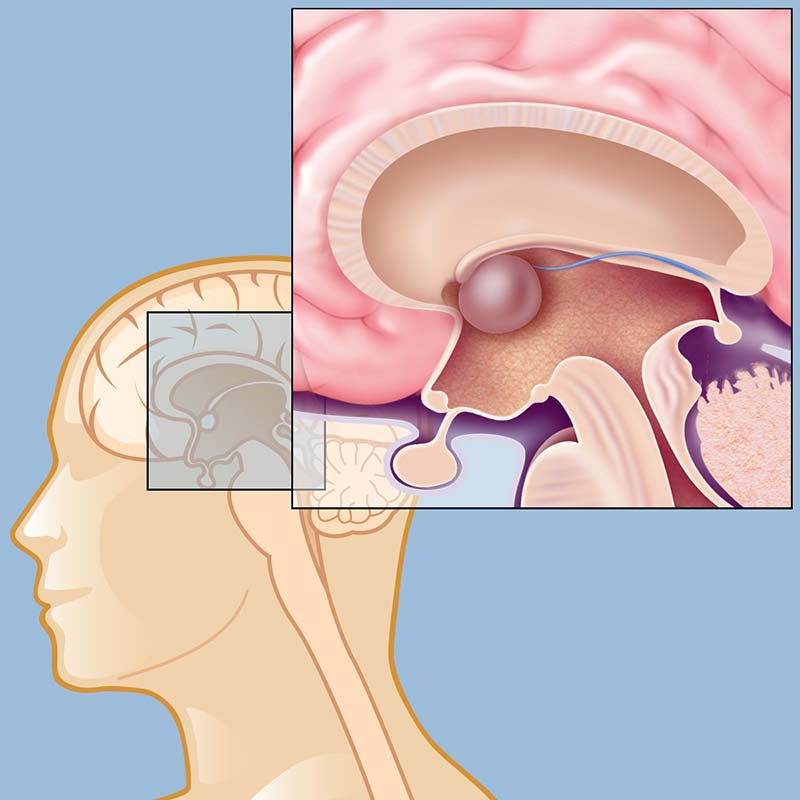Colloid Cyst

Colloid Cyst
Contact Us
Related Videos :
Frequently Asked Questions (FAQ) :
What are the chances of recovery from a brain tumor?
- Recovery depends on the type, size, and location of the tumor, as well as the patient’s overall health. Early diagnosis and expert treatment can improve the chances of recovery.
Can brain tumors be prevented?
- While most brain tumors cannot be prevented, reducing exposure to known risk factors, like radiation and environmental toxins, can help lower the risk.
Is brain tumor surgery risky?
All surgeries carry some risk. However, advancements in neurosurgical techniques, such as those used by Dr. Sandeep Vaishya, have made brain tumor surgeries safer with better outcomes.

About Colloid Cyst
A Colloid Cyst is a slow-growing, benign (non-cancerous) tumor located in the third ventricle of the brain. While generally small in size, this cyst can block the flow of cerebrospinal fluid (CSF), leading to increased pressure inside the skull. Early detection and treatment are essential to prevent complications such as hydrocephalus (fluid buildup in the brain) and other serious neurological symptoms.
Dr. Sandeep Vaishya, one of the leading neurosurgeons in India, has years of experience in treating colloid cysts using the most advanced neurosurgical techniques. His extensive knowledge and patient-first approach ensure the best possible outcomes for those diagnosed with this condition.
Causes of Colloid Cysts
The exact cause of colloid cysts is not well understood. However, researchers believe these cysts may develop due to:
- Abnormal development during brain formation.
- Congenital factors.
- Possible genetic links (although this is rare).
Despite being present at birth, colloid cysts can remain asymptomatic for years before causing any issues, particularly in adulthood.
Types of Colloid Cysts
Colloid cysts are categorized based on their size and location. While most colloid cysts are located in the third ventricle, there can be variations in their shape, size, and consistency. They can range from:
- Small cysts (typically less than 1 cm): May remain asymptomatic for long periods.
- Larger cysts: These are more likely to cause symptoms by blocking cerebrospinal fluid (CSF) flow, leading to hydrocephalus.
Symptoms of Colloid Cysts
Symptoms of colloid cysts vary depending on their size and location but may include:
- Headaches (often sudden and severe)
- Nausea and vomiting
- Balance and coordination problems
- Memory disturbances
- Vision problems (blurred vision or double vision)
- Weakness in the legs
- Loss of consciousness (in extreme cases)
If you experience these symptoms, it is crucial to seek medical attention as colloid cysts can lead to life-threatening complications if left untreated.
Diagnosis of Colloid Cysts
Early and accurate diagnosis of a colloid cyst is essential for effective treatment. Dr. Sandeep Vaishya utilizes advanced neuroimaging techniques to diagnose this condition. The typical steps in the diagnosis include:
- MRI (Magnetic Resonance Imaging): An MRI scan can provide detailed images of the brain, helping identify the size and location of the cyst.
- CT Scan: A CT scan is another diagnostic tool that can show the presence of the cyst and any resulting hydrocephalus.
- Neurological Examination: A physical examination can reveal symptoms like impaired balance, vision issues, and headaches, which might suggest the presence of a colloid cyst.
Treatment of Colloid Cysts
When a colloid cyst is symptomatic, treatment becomes necessary to prevent severe complications. The most common treatments include:
1. Surgical Removal
Dr. Sandeep Vaishya specializes in minimally invasive neurosurgery for colloid cyst removal. Two common methods are:
- Endoscopic Surgery: This is a less invasive procedure in which a small camera and tools are inserted through a tiny incision in the skull to remove the cyst. It offers quicker recovery times.
- Craniotomy: In some cases, a traditional craniotomy may be necessary, where a portion of the skull is temporarily removed to access and excise the cyst.
2. Shunt Placement
For patients with hydrocephalus, a shunt may be placed to drain excess cerebrospinal fluid, reducing pressure within the skull.
3. Observation
In cases where the cyst is small and not causing symptoms, periodic monitoring through imaging tests may be recommended.
Dr. Vaishya will carefully evaluate each patient to determine the most appropriate treatment plan based on their specific condition.
Cost of Colloid Cyst Treatment in India
The cost of colloid cyst treatment in India is relatively affordable compared to other countries. Factors affecting the cost include:
- Type of surgery (endoscopic vs. craniotomy)
- Length of hospital stay
- Postoperative care and follow-up
- Hospital and surgeon fees
On average, the cost of colloid cyst surgery in India ranges from $4,000 to $10,000 USD, depending on the complexity of the case.
Stay in India for Colloid Cyst Treatment
International patients seeking colloid cyst treatment in India can expect:
- Stay Duration: Typically, the hospital stay lasts 3 to 7 days, depending on the type of surgery and recovery progress. Postoperative follow-up may extend the stay to two weeks or more.
- Accommodation: India offers a wide range of accommodation options, from budget to luxury, making it convenient for patients and their families.
- Medical Visa Assistance: Dr. Sandeep Vaishya’s team can assist with medical visa applications and travel arrangements to ensure a smooth experience for international patients.